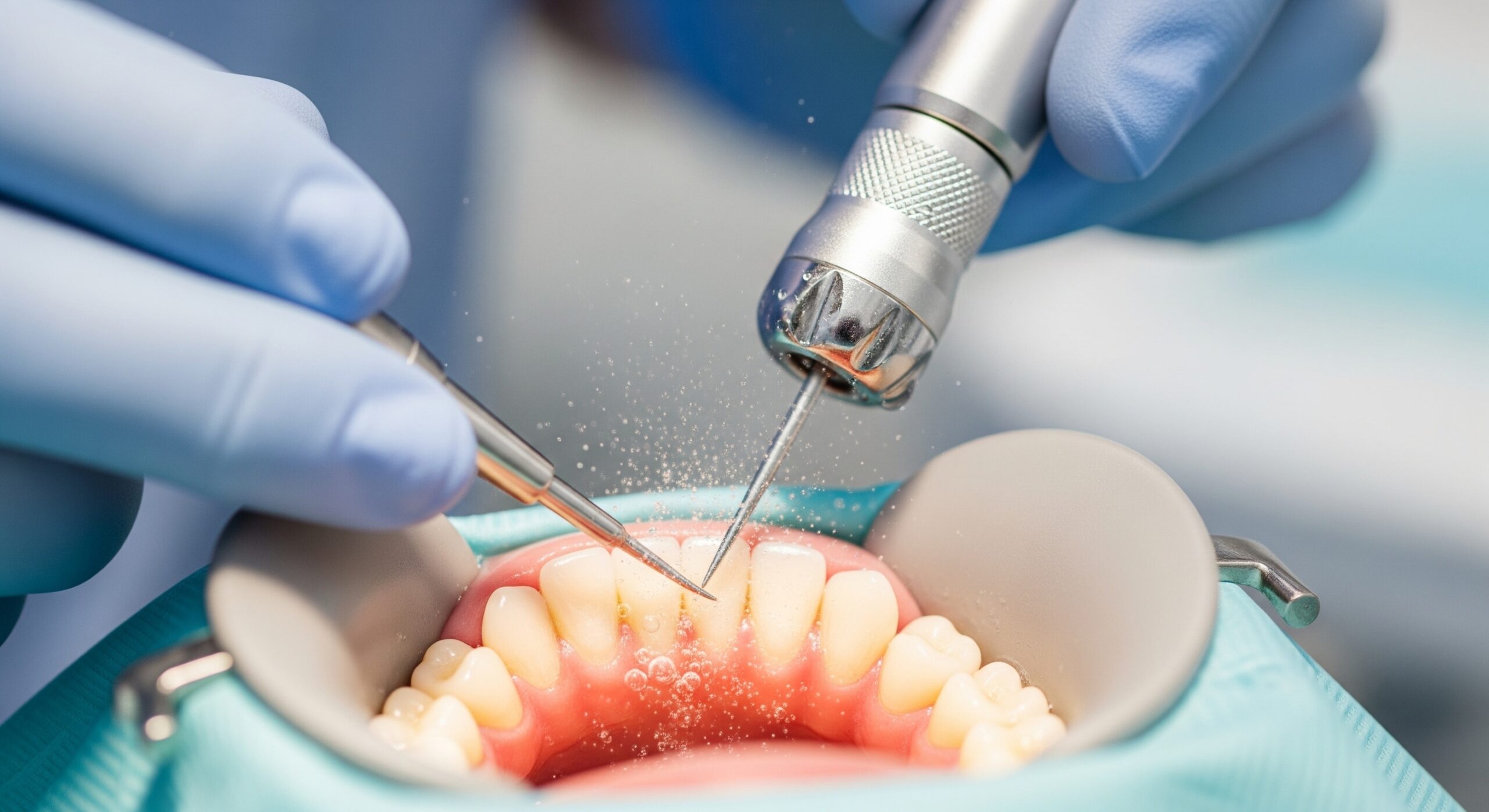Scaling and Root Planing

Deep Cleaning for Healthy Gums Scaling & Root Planing in Kolkata
Non-Surgical Gum Disease Treatment at Smile For All Dental Clinic
Bleeding gums? Bad breath? Gum sensitivity? These are often early signs of gum disease, a condition that can silently damage your gums and bone if left untreated.
At Smile For All Dental Clinic in Kolkata, we offer scaling and root planing—also known as deep cleaning—as a safe, effective, and non-surgical way to treat gingivitis and periodontitis, protect your teeth, and restore healthy gums.

What Is Scaling and Root Planing?
Scaling and root planing is a professional dental procedure designed to remove plaque, tartar, and harmful bacteria from below the gum line—areas that regular brushing and flossing can’t reach. This deep cleaning targets the root cause of gum infections and stops them from progressing into severe periodontal disease.
It’s usually recommended when gum pockets exceed 3mm in depth and signs of inflammation, bleeding, or bone loss are present.
The Two Steps of Deep Cleaning
-
Scaling
We use ultrasonic scalers and fine hand instruments to carefully remove hardened plaque (tartar) and bacterial toxins from above and below the gum line, especially inside deep periodontal pockets.
-
Root Planing
Next, the roots of your teeth are smoothed to eliminate rough spots where bacteria collect. This process helps the gums reattach to the tooth surface, reduces pocket depth, and halts further gum damage.
Most patients need two or more sessions to treat all quadrants of the mouth thoroughly. Local anesthesia is used to keep you comfortable throughout the process.


Signs You May Need Scaling & Root Planing
You might be a candidate for deep cleaning if you have:
- Red, swollen, or tender gums
- Gums that bleed easily when brushing or flossing
- Persistent bad breath or a bad taste in your mouth
- Receding gums or teeth that appear “longer”
- Loose teeth or shifting bite
- Deep gum pockets (4mm or more) confirmed on X-rays or exam
Benefits of Scaling and Root Planing
Stops Gum Disease Progression
Removes infection-causing bacteria and prevents mild gum disease from advancing into bone-destroying periodontitis.
Reduces Inflammation & Bleeding
Once the plaque and tartar are removed, your gums become firmer, less inflamed, and stop bleeding.
Shrinks Gum Pockets
Allows gums to reattach and reduces the depth of pockets, making it harder for bacteria to recolonize.
Prevents Tooth Loss
Protects the bone and soft tissue that support your teeth—reducing the risk of future extractions.
Improves Breath & Oral Hygiene
Eliminates odor-causing bacteria and creates a clean surface for easier brushing and flossing.
What to Expect After Deep Cleaning
Most patients experience mild sensitivity or tenderness for a few days after the procedure. You may be advised to:
- Avoid hard or crunchy foods for 24–48 hours
- Use desensitizing toothpaste or mouthwash
- Rinse with warm salt water to soothe gums
- Maintain excellent brushing and flossing habits
- Return for a follow-up visit or periodontal maintenance cleaning every 3–4 months

Frequently Asked Questions
About Scaling & Root Planing
No. The procedure is done under local anesthesia to numb your gums. Most patients report little to no discomfort during treatment. Some soreness afterward is normal and temporary.
Routine cleanings focus on removing plaque above the gum line. Deep cleaning targets bacteria and tartar below the gums, where infection begins, and smooths the tooth roots to aid healing.
You may have mild gum tenderness or sensitivity for a few days. Gums usually heal within 1–2 weeks, with noticeable improvements in inflammation and bleeding.
If you maintain excellent oral hygiene, you may not need it again. However, patients with chronic gum disease often require periodontal maintenance every 3–4 months to prevent recurrence.
In many cases, yes. Most dental insurance plans cover deep cleaning when it’s medically necessary for gum disease. We’ll help verify your benefits and discuss costs upfront.
Protect Your Gums Before It's Too Late
Gum disease is a leading cause of tooth loss—and it’s largely preventable with early care. If you’re noticing signs of gum problems, don’t wait.
Appointment booking form
